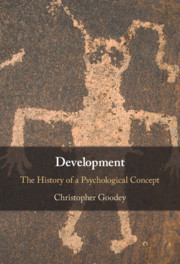Book contents
- Development
- Development
- Copyright page
- Contents
- Acknowledgements
- Introduction
- Chapter 1 Development and the Origin of Psychological Concepts
- Chapter 2 The History of Christianity and the First Principles of Development: Linear Time, Interiority, Structure
- Chapter 3 The History of Education: Rearing the Elect Child
- Chapter 4 Pascal on the Ordering of Human Time
- Chapter 5 The Normalization of the Elect: Locke to Montesquieu
- Chapter 6 The Coining of a Developmental Theory: Leibniz to Bonnet
- Chapter 7 Emile: Rousseau’s Well-Ordered Developer
- Chapter 8 Nature versus Nurture and Cognitive Ability Testing: Historical Sketches
- Postscript Further Targets for Historical Research
- Index
Chapter 6 - The Coining of a Developmental Theory: Leibniz to Bonnet
Published online by Cambridge University Press: 10 June 2021
- Development
- Development
- Copyright page
- Contents
- Acknowledgements
- Introduction
- Chapter 1 Development and the Origin of Psychological Concepts
- Chapter 2 The History of Christianity and the First Principles of Development: Linear Time, Interiority, Structure
- Chapter 3 The History of Education: Rearing the Elect Child
- Chapter 4 Pascal on the Ordering of Human Time
- Chapter 5 The Normalization of the Elect: Locke to Montesquieu
- Chapter 6 The Coining of a Developmental Theory: Leibniz to Bonnet
- Chapter 7 Emile: Rousseau’s Well-Ordered Developer
- Chapter 8 Nature versus Nurture and Cognitive Ability Testing: Historical Sketches
- Postscript Further Targets for Historical Research
- Index
Summary
The normalization of the elect acquired a corresponding theoretical framework. From the late seventeenth century the preferred explanation for physical growth had been ‘preformation’: the theory, starting with Swammerdam, that all living organisms have pre-existed from the Creation and are born as miniature versions which ‘unfold’ through predetermined stages. Leibniz suggested applying preformationism to the human mind. It was in this context that the word itself, ‘development’ (whose first appearances are better translated as ‘unfolding’), was first employed. The pioneering naturalist Charles Bonnet went on to apply the theory of preformationism to what he now expressly termed ‘psychology’. He identified psychology with the stages of regeneration in the elect (the so-called economy of grace); he linked this development of the person to the Enlightenment idea of ‘social progress’, and represented both as a gradual (rather than instantaneous) unfolding of biblical Revelation.
- Type
- Chapter
- Information
- DevelopmentThe History of a Psychological Concept, pp. 137 - 165Publisher: Cambridge University PressPrint publication year: 2021

